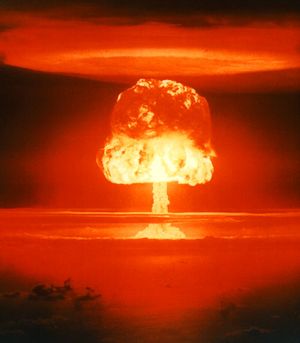بيان رسل-أينشتاين

~ Albert Einstein & Bertrand Russell[1]
بيان رسل-أينشتاين Russell–Einstein Manifesto هو بيان نشر في لندن في 9 يوليو 1955 من قِبل برتراند رسل في خضم الحرب الباردة. يشير البيان إلى مخاطر الأسلحة النووية ويدعو قادة العالم لبحث حلول سلمية للنزاعات الدولية. وقع على البيان أحد عشر عالما ومفكرا أهمهم ألبرت أينشتاين الذي تسلم مسودة البيان قبل أيام من وفاته من برتراند راسل الذي يدعوه إلى التوقيع على البيان، في حالة موافقته على المحتوى[2]. كان العالم الفيزيائي جوسف روتبلات أصغر العلماء الذين وقعوا على البيان وهو حائز على جائزة نوبل للسلام في 1995 وقد ترأس مؤتمر باجواش للعلوم والشؤون الدولية لفترة طويلة[2]. وبعد أيام قليلة من نشر البيان، عرض رجل الخير سايروس إيتون أن يرعى المؤتمر، الذي يدعو إليه البيان، في پگواش، نوڤا سكوشيا، مسقط رأس إيتون. وقد كان هذا المؤتمر الأول من مؤتمرات پگواش في العلوم وشئون العالم، وقد انعقد في يوليو 1957.
. . . . . . . . . . . . . . . . . . . . . . . . . . . . . . . . . . . . . . . . . . . . . . . . . . . . . . . . . . . . . . . . . . . . . . . . . . . . . . . . . . . . . . . . . . . . . . . . . . . . . . . . . . . . . . . . . . . . . . . . . . . . . . . . . . . . . . . . . . . . . . . . . . . . . . . . . . . . . . . . . . . . . . . .
المؤتمر الصحفي، 9 يوليو 1955
The manifesto was released during a press conference at Caxton Hall, London. Rotblat, who chaired the meeting, describes it as follows:[3]
It was thought that only a few of the Press would turn up and a small room was booked in Caxton Hall for the Press Conference. But it soon became clear that interest was increasing and the next larger room was booked. In the end the largest room was taken and on the day of the Conference this was packed to capacity with representatives of the press, radio and television from all over the world. After reading the Manifesto, Russell answered a barrage of questions from members of the press, some of whom were initially openly hostile to the ideas contained in the Manifesto. Gradually, however, they became convinced by the forcefulness of his arguments, as was evident in the excellent reporting in the Press, which in many cases gave front page coverage.
بدأ رسل المرتمر بقول ما يلي:[3]
I am bringing the warning pronounced by the signatories to the notice of all the powerful Governments of the world in the earnest hope that they may agree to allow their citizens to survive.
ملخص
The manifesto called for a conference where scientists would assess the dangers posed to the survival of humanity by weapons of mass destruction. Emphasis was placed on the meeting being politically neutral. It extended the question of nuclear weapons to all people and governments. One particular phrase is quoted often, including by Rotblat upon receipt of the Nobel Peace Prize in 1995:[4]:320
Remember your humanity, and forget the rest.
بدايات مؤتمرات پگواش
The manifesto called for an international conference, and was originally planned by Jawaharlal Nehru to be held in India. This was delayed by the outbreak of the Suez Crisis. Aristotle Onassis offered to finance a meeting in Monaco, but this was rejected. Instead, Cyrus Eaton, a Canadian industrialist who had known Russell since 1938, offered to finance the conference in his hometown of پگواش، نوڤا سكوتشا. بيان رسل-أينشتاين أصبح الميثاق التأسيسي لمؤتمرات پگواش. أول تلك المؤتمرات انعقد في يوليو 1957 في پگواش.[5]
الموقعون على البيان
- ماكس بورن
- پرسي و. بريدجمان
- ألبرت أينشتاين
- ليوپولد إنفلد
- فريديريك جوليو-كوري
- هرمان جوسف مولر
- لاينس پولنگ
- سسيل فرانك پاول
- جوسف رتبلات
- برتراند رسل
- هيدكي يوكاوا
عشرة من الموقعون الأحد عشر على بيان رسل-أينشتاين هم من الحاصلين على جائزة نوبل، الاستثناء الوحيد ليوپولد إنفلد.
انظر أيضاً
المصادر
- ^ Einstein, Albert; Russell, Bertrand (9 July 1955). The Russell-Einstein Manifesto. London.
{{cite book}}: CS1 maint: location missing publisher (link) - ^ أ ب أينشتاين والقنبلة الذرية
- ^ أ ب Rotblat, Joseph (1982). Proceedings of the first Pugwash Conference on Science and World Affairs. London: Pugwash Council. p. 6. OCLC 934755212.
- ^ Russell, Bertrand (2003). The Collected Papers of Bertrand Russell: Man's Peril, 1954–55. London: Routledge. ISBN 978-0-415-09424-5.
- ^ خطأ استشهاد: وسم
<ref>غير صحيح؛ لا نص تم توفيره للمراجع المسماةionno
